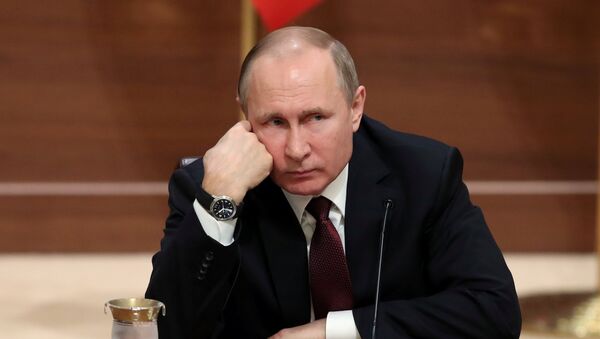Germany’s Minister of Defense Ursula von der Leyen has laid out her views on Germany’s relations with Russia in her interview to Sunday’s edition of the Bild newspaper, where she called for a harder stance on Russia and backed the US-led airstrikes on Syria following an alleged chemical attack in Douma, which was blamed by the West on the government forces even prior to the launch of an investigation into the incident.
Ursula von der Leyen, being the only minister of the previous German government to maintain her post in the new one, said that the Russian president “doesn’t appreciate weakness,” which should define Germany’s policy towards Russia.
"President (Vladimir) Putin doesn’t appreciate weakness, attempts to befriend him or flexibility don’t make him friendlier,” she alleged.
According to von der Leyen, the key problem is that the Kremlin allegedly needs an “enemy image,” which hasn’t been the narrative adopted by the Western countries.
The minister, representing the Christian Democratic Union (CDU), said that the West should be ready for a dialogue with Moscow from the “position of force and unity.” At the same time, she called for changing the decision-making process in the EU, which would let take decisions with a majority, agreeing on it (now, the unanimous support of all the 28 members is needed). It would help to improve a common European foreign policy and ensure prompt joint responses to global affairs.
She claimed that she would also like to have better relations with Russia, but named several issues: the reunification of Russia and Crimea; the conflict in eastern Ukraine as well as Russian support of the Syrian government; and the cyberattacks the Western countries accuse Russia of.
She told the newspaper that the West should keep pressuring Russia with sanctions until the Minsk agreements are fulfilled. However she warned against such means as boycotting the 2018 World Cup, which is to take place in Russia this summer.
READ MORE: Germany, EU 'Enabling Ukraine to Refrain From Implementing Minsk Agreements'
“I don’t think that it’s right. We are politicians, and we should solve problems with political instruments. We are fighting for the political decisions, and we can’t burden soccer players and their fans with them,” said von der Leyen.
Following the Skripal poisoning in the UK in March, Prime Minister Theresa May said that neither her ministers nor members of the British royal family would attend this year's World Cup. The governments of Poland and Iceland have also announced that their top officials would also skip the event.
At the same time, Australian Foreign Minister Julie Bishop tweeted earlier that the country’s authorities wouldn’t boycott the Russian-hosted major football event, while the Belgian foreign minister, Didier Reynders, said in a recent interview that "it does not make much sense to go in that direction [of boycotting the event].”
Germany has backed the UK in its sanctions following the poisoning of former Russian spy Sergei Skripal in Salisbury, which the UK has accused Moscow of, expelling Russian diplomats without waiting for the results of the investigation, which is still underway. Russia has refuted having any role in the poisoning, pointing to the lack of evidence provided by London to substantiate its accusations.
The German government also backed the joint airstrikes of the UK, the US and France on April 14, following the alleged chemical attack in Syrian Douma a week prior, which has been blamed by the West on the Syrian government forces. Syria and Russia have dismissed the allegations. An OPCW investigation recently commenced, as the international expert mission finally reached the site of the alleged attack to collect evidence.


